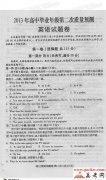山东省济南外国语学校2012届高三5月份适应性训练英语试题(4)
2012-05-27 21:55:42
D. she was gifted to feel the spirits.
57. In the example of Phyllis Timms, _________________.
A. Coral failed to draw the portrait of the dead.
B. Phyllis eventually admitted the portrait was right about her grandfather.
C. Coral knew green was a name.
D. Phyllis didn’t prove Coral’s talent.
58. What we can infer from the last paragraph is that ______________________.
A. people should believe in the spirits.
B. science can explain what happened to Coral.
C. people can learn supernatural powers.
D. some mysteries on human beings haven’t been solved yet.
C
Here below we will talk about the American expressions using the word “Dutch”. Many of the “Dutch” expressions heard in American English were first used in England in the seventeenth century. Britain used to be called “empire on which the sun never sets”,which gained its supreme[至高无上的] power mostly by its naval military forces. The period of the Anglo-Dutch Wars was a time of fierce naval competition between England and the Netherlands. At that time, the British used “Dutch” as a word for something bad, or false, or mistaken.
A “Dutch agreement” was one made between men who had drunk too much alcohol. “Dutch courage” was the false courage produced by the effects of drinking alcohol. And “Dutch leave” was what a solider took when he left his base[基地] without permission.
Some of these old expressions are still used today with a little different meaning. “Dutch treat” is one example. Long ago, a Dutch treat was a dinner at which the invited guests were expected to pay for their own share of the food and drink. Now, Dutch treat means that when friends go out to have fun, each person pays his own share.
Another common expression heard a few years ago was “in Dutch”, which simply referred to the country then. Nowadays, if someone says to you, you are in Dutch, they are telling you that you were in trouble. An important person, a parent or teacher perhaps, is angry with you.
Some of the Dutch expressions heard in American English have nothing to do with the Dutch people at all. In the 1700s, Germans who moved to the United States often were called Dutch. This happened because of mistakes in understanding and saying the word “Deutsch”, the German word for German. Families of these German people still live in the eastern United States, many in the state of Pennsylvania. They are known as the Pennsylvania Dutch.
During the American Civil War, supporters of the northern side in the central state of Missouri were called Dutch, because many of them were German settlers. In California, during the Gold Rush, the term Dutch was used to describe Germans, Swedes, and Norwegians as well as people from the Netherlands.
President Theodore Roosevelt once noted that anything foreign and non-English was called Dutch. One expression still in use, “to talk to someone like a Dutch uncle”, did come from the Dutch. The Dutch were known for the firm way they raise their children. So if someone speaks to you like a Dutch uncle, he is speaking in a very severe way. And you should listen to him carefully.
59. According to paragraph 1, the British used “Dutch” as a word for something bad and mistaken because ___________.
A. it was the long-lasting habit of the British language.
B. the Netherlands was the closest rival for naval supremacy then.
C. there was a close connection between “Dutch” and “Deutsch”.
D. anything foreign and non-English was called “Dutch”.
60. Most probably, a man with Dutch courage would _________.
A. invite his friends to dinner.
B. beat a strange passer-by without any reason.
C. speak to a Dutch uncle.
D. become angry with the teacher.
61. Which one of the following has nothing to do with the Dutch?
A. The expression “to talk to someone like a Dutch uncle”.
B. When friends go out to have fun, they choose Dutch treat.
C. Germans who moved to the United States were called Dutch.
D. A solider took “Dutch leave” during wars.
62. What is mainly talked about in the passage?
A. Language causes of the Anglo-Dutch Wars
B. Language of the Netherlands
C. Deutsch V.S. Dutch
D. Dutch expressions in American English
D
An “apple polisher” is one who gives gifts to win friendship or special treatment. It is not exactly a bribe(贿赂),but is close to it.
All sorts of people are apple polishers, including politicians and people in high offices ── just about everybody. Oliver Cromwell, the great English leader, offered many gifts to win the support of George Fox and his party, but failed.
There are other phrases meaning the same thing as “apple-polishing” ── “soft-soaping” or “butter-up”. A gift is just one way to “soft-soap” somebody, or to “butter him up”. Another that is just as effective is flattery, giving someone high praise ── telling him how good he looks, or how well he speaks, or how talented and wise he is.
Endless are the ways of flattery. Who does not love or hear it ? Only an unusual man can resist the thrill of being told how wonderful he is. In truth, flattery is good medicine for most of us, who gets so little of it.
We need it to be more sure of ourselves. It cannot hurt unless we get carried away by it. But we just lap it up for its food value and nourishment, as a cat laps up milk, then we can still remain true to ourselves.
Sometimes, however, flattery will get you nothing from one who has had too much of it. A good example is the famous 12th century legend of King Canute of Denmark and England. The king got tired of listening to the endless sickening flattery of his courtiers(朝臣).They overpraised him to the skies, as a man of limitless power.







